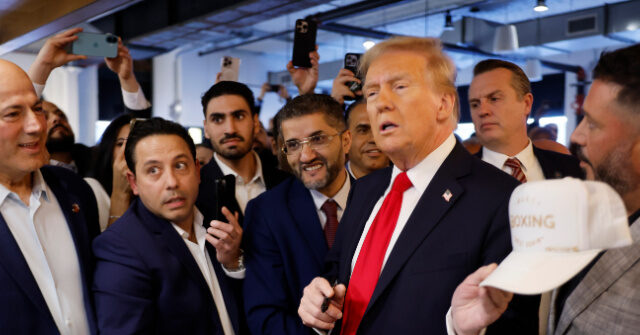In Dearborn, Michigan, a significant shift is being observed within the Arab-American community as many express support for former President Donald Trump’s potential return to the White House. This sentiment was prominently showcased during his recent visit to the city. A local restaurant owner, in a video shared by the Trump War Room, lamented the Biden-Harris administration’s performance, critiquing their handling of humanitarian issues and the ongoing conflicts affecting their families overseas. He articulated a strong desire for a leader who prioritizes human dignity, stating that the current administration has not only neglected these issues but has contributed to the continued suffering of people in the Middle East. This public support highlights a growing disillusionment with the incumbent administration among Arab-Americans, who are seeking a change with a focus on peace and stability.
The restaurant owner emphasized the deep connection Arab-Americans feel to both their heritage and their American identity, reinforcing their contributions to society through diverse professions. He asserted that Arab-Americans enrich the nation with their culture, education, and dedication, showcasing a broad spectrum of talent that spans various fields, from medicine to the arts. This pride in identity positions the community as vital to the American fabric while simultaneously expressing a collective hope for a better future under Trump’s leadership, particularly concerning peace initiatives in Lebanon and Palestine. The call for prioritizing robust policies aimed at resolving geopolitical tensions reflects a yearning for effective governance in foreign affairs.
Trump’s visit to Dearborn marked a historic moment, being the first time a presidential candidate from a major political party has actively campaigned in the area. His message resonated with many as he asked for votes by promising a commitment to achieving peace in the Middle East. Videos from his visit demonstrated his efforts to connect with the Muslim American community. Moments of connection were evident as supporters cheered affirmations of loyalty, with attendees declaring, “Dearborn is Trump country!” These interactions signify a growing enthusiasm for Trump within a community that has traditionally been a significant voting bloc, further complicating the political landscape as the 2024 presidential election approaches.
Recent polling trends suggest that Trump is gaining traction among Arab-American voters, largely due to growing dissatisfaction with the Biden administration’s approach to international crises, particularly the turmoil between Israel and Hamas. This discontent is palpable in community discussions, where leaders like Imam Husham Al-Husainy have voiced leaning towards Trump, citing a perceived alignment with biblical and Quranic ideals. Such endorsements reflect a strategic reassessment among some Muslim voters who are prioritizing candidates they believe will advocate for peace and justice in a region grappling with long-standing conflicts.
Amid the electoral landscape, political figures such as Dearborn Mayor Abdullah Hammoud have refrained from endorsing any candidate outright. However, the support from other local leaders, such as Hamtramck Mayor Ameer Ghalib, who has declared Trump as the “right choice,” signals a notable split within the community regarding political affiliations. The endorsement of Trump by certain Muslim leaders during gatherings, where they emphasized his promise of peace over conflict, adds another layer to the evolving perception of his candidacy. Their collective voices highlight a desire for genuine engagement in Middle Eastern policy, as many in the community feel their concerns have not been adequately addressed by current leaders.
As Trump’s campaign gains momentum, it reflects a broader narrative of shifting allegiances among traditional voting blocs. The response from the Arab-American community and their visible support juxtaposes the challenges faced by the Democratic Party in maintaining these voters. This reconfiguration in voter sentiments underscores the necessity for candidates to engage deeply with diverse communities to understand their unique challenges and aspirations. As the election nears, it remains critical for all candidates to recognize the implications of these changing dynamics, ensuring that their platforms resonate with the electorate’s desire for peace, stability, and representation in the intricate political dialogue surrounding Middle Eastern affairs.

